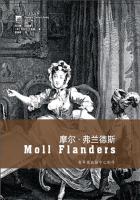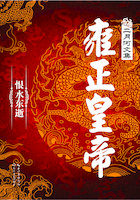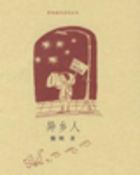WE were now down in Westminster. We had turned back to follow her, having encountered her coming towards us; and Westminster Abbey was the point at which she passed from the lights and noise of the leading streets. She proceeded so quickly, when she got free of the two currents of passengers setting towards and from the bridge, that, between this and the advance she had of us when she struck off, we were in the narrow water-side street by Millbank before we came up with her. At that moment she crossed the road, as if to avoid the footsteps that she heard so close behind; and, without looking back, passed on even more rapidly.
A glimpse of the river through a dull gateway, where some waggons were housed for the night, seemed to arrest my feet. I touched my companion without speaking, and we both forbore to cross after her, and both followed on that opposite side of the way; keeping as quietly as we could in the shadow of the houses, but keeping very near her.
There was, and is when I write, at the end of that low-lying street, a dilapidated little wooden building, probably an obsolete old ferry-house. Its position is just at that point where the street ceases, and the road begins to lie between a row of houses and the river. As soon as she came here, and saw the water, she stopped as if she had come to her destination; and presently went slowly along by the brink of the river, looking intently at it.
All the way here, I had supposed that she was going to some house; indeed, I had vaguely entertained the hope that the house might be in some way associated with the lost girl. But that one dark glimpse of the river, through the gateway, had instinctively prepared me for her going no farther.
The neighbourhood was a dreary one at that time; as oppressive, sad, and solitary by night, as any about London. There were neither wharves nor houses on the melancholy waste of road near the great blank Prison. A sluggish ditch deposited its mud at the prison walls. Coarse grass and rank weeds straggled over all the marshy land in the vicinity. In one part, carcases of houses, inauspiciously begun and never finished, rotted away. In another, the ground was cumbered with rusty iron monsters of steam-boilers, wheels, cranks, pipes, furnaces, paddles, anchors, diving-bells, windmill-sails, and I know not what strange objects, accumulated by some speculator, and grovelling in the dust, underneath which—having sunk into the soil of their own weight in wet weather—they had the appearance of vainly trying to hide themselves. The clash and glare of sundry fiery Works upon the river-side, arose by night to disturb everything except the heavy and unbroken smoke that poured out of their chimneys. Slimy gaps and causeways, winding among old wooden piles, with a sickly substance clinging to the latter, like green hair, and the rags of last year's handbills offering rewards for drowned men fluttering above high-water mark, led down through the ooze and slush to the ebb-tide. There was a story that one of the pits dug for the dead in the time of the Great Plague was hereabout; and a blighting influence seemed to have proceeded from it over the whole place. Or else it looked as if it had gradually decomposed into that nightmare condition, out of the overflowings of the polluted stream.
As if she were a part of the refuse it had cast out, and left to corruption and decay, the girl we had followed strayed down to the river's brink, and stood in the midst of this night-picture, lonely and still, looking at the water.
There were some boats and barges astrand in the mud, and these enabled us to come within a few yards of her without being seen. I then signed to Mr. Peggotty to remain where he was, and emerged from their shade to speak to her. I did not approach her solitary figure without trembling; for this gloomy end to her determined walk, and the way in which she stood, almost within the cavernous shadow of the iron bridge, looking at the lights crookedly reflected in the strong tide, inspired a dread within me.
I think she was talking to herself. I am sure, although absorbed in gazing at the water, that her shawl was off her shoulders, and that she was muffling her hands in it, in an unsettled and bewildered way, more like the action of a sleep-walker than a waking person. I know, and never can forget, that there was that in her wild manner which gave me no assurance but that she would sink before my eyes, until I had her arm within my grasp.
At the same moment I said‘Martha!’
She uttered a terrified scream, and struggled with me with such strength that I doubt if I could have held her alone. But a stronger hand than mine was laid upon her; and when she raised her frightened eyes and saw whose it was, she made but one more effort and dropped down between us. We carried her away from the water to where there were some dry stones, and there laid her down, crying and moaning. In a little while she sat among the stones, holding her wretched head with both her hands.
‘Oh, the river!’she cried passionately.‘Oh, the river!’
‘Hush, hush!’said I.‘Calm yourself.’
But she still repeated the same words, continually exclaiming,‘Oh, the river!’over and over again.
‘I know it's like me!’she exclaimed.‘I know that I belong to it. I know that it's the natural company of such as I am! It comes from country places, where there was once no harm in it—and it creeps through the dismal streets, defiled and miserable—and it goes away, like my life, to a great sea, that is always troubled—and I feel that I must go with it!’I have never known what despair was, except in the tone of those words.
‘I can't keep away from it. I can't forget it. It haunts me day and night. It's the only thing in all the world that I am fit for, or that's fit for me. Oh, the dreadful river!’
The thought passed through my mind that in the face of my companion, as he looked upon her without speech or motion, I might have read his niece's history, if I had known nothing of it. I never saw, in any painting or reality, horror and compassion so impressively blended. He shook as if he would have fallen; and his hand—I touched it with my own, for his appearance alarmed me—was deadly cold.
‘She is in a state of frenzy,’I whispered to him.‘She will speak differently in a little time.’
I don't know what he would have said in answer. He made some motion with his mouth, and seemed to think he had spoken; but he had only pointed to her with his outstretched hand.
A new burst of crying came upon her now, in which she once more hid her face among the stones, and lay before us, a prostrate image of humiliation and ruin. Knowing that this state must pass, before we could speak to her with any hope, I ventured to restrain him when he would have raised her, and we stood by in silence until she became more tranquil.
‘Martha,’said I then, leaning down, and helping her to rise—she seemed to want to rise as if with the intention of going away, but she was weak, and leaned against a boat.‘Do you know who this is, who is with me?’
She said faintly,‘Yes.’
‘Do you know that we have followed you a long way tonight?’
She shook her head. She looked neither at him nor at me, but stood in a humble attitude, holding her bonnet and shawl in one hand, without appearing conscious of them, and pressing the other, clenched, against her forehead.
‘Are you composed enough,’said I,‘to speak on the subject which so interested you—I hope Heaven may remember it!—that snowy night?’
Her sobs broke out afresh, and she murmured some inarticulate thanks to me for not having driven her away from the door.
‘I want to say nothing for myself,’she said, after a few moments.‘I am bad, I am lost. I have no hope at all. But tell him, sir,’she had shrunk away from him,‘if you don't feel too hard to me to do it, that I never was in any way the cause of his misfortune.’
‘It has never been attributed to you,’I returned, earnestly responding to her earnestness.
‘It was you, if I don't deceive myself,’she said, in a broken voice,‘that came into the kitchen, the night she took such pity on me; was so gentle to me; didn't shrink away from me like all the rest, and gave me such kind help! Was it you, sir?’
‘It was,’said I.
‘I should have been in the river long ago,’she said, glancing at it with a terrible expression,‘if any wrong to her had been upon my mind. I never could have kept out of it a single winter's night, if I had not been free of any share in that!’
‘The cause of her flight is too well understood,’I said.‘You are innocent of any part in it, we thoroughly believe,—we know.’
‘Oh, I might have been much the better for her, if I had had a better heart!’exclaimed the girl, with most forlorn regret;‘for she was always good to me! She never spoke a word to me but what was pleasant and right. Is it likely I would try to make her what I am myself, knowing what I am myself, so well? When I lost everything that makes life dear, the worst of all my thoughts was that I was parted for ever from her!’
Mr. Peggotty, standing with one hand on the gunwale of the boat, and his eyes cast down, put his disengaged hand before his face.
‘And when I heard what had happened before that snowy night, from some belonging to our town,’cried Martha,‘the bitterest thought in all my mind was, that the people would remember she once kept company with me, and would say I had corrupted her! When, Heaven knows, I would have died to have brought back her good name!’
Long unused to any self-control, the piercing agony of her remorse and grief was terrible.
‘To have died, would not have been much—what can I say?—I would have lived!’she cried.‘I would have lived to be old, in the wretched streets—and to wander about, avoided, in the dark—and to see the day break on the ghastly line of houses, and remember how the same sun used to shine into my room, and wake me once—I would have done even that, to save her!’
Sinking on the stones, she took some in each hand, and clenched them up, as if she would have ground them. She writhed into some new posture constantly: stiffening her arms, twisting them before her face, as though to shut out from her eyes the little light there was, and drooping her head, as if it were heavy with insupportable recollections.
‘What shall I ever do!’she said, fighting thus with her despair.‘How can I go on as I am, a solitary curse to myself, a living disgrace to everyone I come near!’Suddenly she turned to my companion.‘Stamp upon me, kill me! When she was your pride, you would have thought I had done her harm if I had brushed against her in the street. You can't believe—why should you?—a syllable that comes out of my lips. It would be a burning shame upon you, even now, if she and I exchanged a word. I don't complain. I don't say she and I are alike—I know there is a long, long way between us. I only say, with all my guilt and wretchedness upon my head, that I am grateful to her from my soul, and love her. Oh, don't think that all the power I had of loving anything is quite worn out! Throw me away, as all the world does. Kill me for being what I am, and having ever known her; but don't think that of me!’
He looked upon her, while she made this supplication, in a wild distracted manner; and, when she was silent, gently raised her.
‘Martha,’said Mr. Peggotty,‘God forbid as I should judge you. Forbid as I, of all men, should do that, my girl! You doen't know half the change that's come, in course of time, upon me, when you think it likely. Well!’he paused a moment, then went on.‘You doen't understand how 'tis that this here gentleman and me has wished to speak to you. You doen't understand what 'tis we has afore us. Listen now!’
His influence upon her was complete. She stood, shrinkingly, before him, as if she were afraid to meet his eyes; but her passionate sorrow was quite hushed and mute.
‘If you heerd,’said Mr. Peggotty,‘owt of what passed between Mas'r Davy and me, th’night when it snew so hard, you know as I have been—wheer not—fur to seek my dear niece. My dear niece,’he repeated steadily.‘Fur she's more dear to me now, Martha, than she was dear afore.’
She put her hands before her face; but otherwise remained quiet.
‘I have heerd her tell,’said Mr. Peggotty,‘as you was early left fatherless and motherless, with no friend fur to take, in a rough seafaring-way, their place. Maybe you can guess that if you'd had such a friend, you'd have got into a way of being fond of him in course of time, and that my niece was kiender daughter-like to me.’
As she was silently trembling, he put her shawl carefully about her, taking it up from the ground for that purpose.
‘Whereby,’said he,‘I know, both as she would go to the wureld's furdest end with me, if she could once see me again; and that she would fly to the wureld's furdest end to keep off seeing me. For though she ain't no call to doubt my love, and doen't—and doen't,’he repeated, with a quiet assurance of the truth of what he said,‘there's shame steps in, and keeps betwixt us.’
I read, in every word of his plain impressive way of delivering himself, new evidence of his having thought of this one topic, in every feature it presented.
‘According to our reckoning,’he proceeded,‘Mas'r Davy's here, and mine, she is like, one day, to make her own poor solitary course to London. We believe—Mas'r Davy, me, and all of us—that you are as innocent of everything that has befell her, as the unborn child. You've spoke of her being pleasant, kind, and gentle to you. Bless her, I knew she was! I knew she always was, to all. You're thankful to her, and you love her. Help us all you can to find her, and may Heaven reward you!’
She looked at him hastily, and for the first time, as if she were doubtful of what he had said.
‘Will you trust me?’she asked, in a low voice of astonishment.
‘Full and free!’said Mr. Peggotty.
‘To speak to her, if I should ever find her; shelter her, if I have any shelter to divide with her; and then, without her knowledge, come to you, and bring you to her?’she asked hurriedly.
We both replied together,‘Yes!’
She lifted up her eyes, and solemnly declared that she would devote herself to this task, fervently and faithfully. That she would never waver in it, never be diverted from it, never relinquish it, while there was any chance of hope. If she were not true to it, might the object she now had in life, which bound her to something devoid of evil, in its passing away from her, leave her more forlorn and more despairing, if that were possible, than she had been upon the river's brink that night; and then might all help, human and Divine, renounce her evermore!
She did not raise her voice above her breath, or address us, but said this to the night sky; then stood profoundly quiet, looking at the gloomy water.
We judged it expedient, now, to tell her all we knew; which I recounted at length. She listened with great attention, and with a face that often changed, but had the same purpose in all its varying expressions. Her eyes occasionally filled with tears, but those she repressed. It seemed as if her spirit were quite altered, and she could not be too quiet.
She asked, when all was told, where we were to be communicated with, if occasion should arise. Under a dull lamp in the road, I wrote our two addresses on a leaf of my pocket-book, which I tore out and gave to her, and which she put in her poor bosom. I asked her where she lived herself. She said, after a pause, in no place long. It were better not to know.
Mr. Peggotty suggesting to me, in a whisper, what had already occurred to myself, I took out my purse; but I could not prevail upon her to accept any money, nor could I exact any promise from her that she would do so at another time. I represented to her that Mr. Peggotty could not be called, for one in his condition, poor; and that the idea of her engaging in this search, while depending on her own resources, shocked us both. She continued steadfast. In this particular, his influence upon her was equally powerless with mine. She gratefully thanked him but remained inexorable.
‘There may be work to be got,’she said.‘I'll try.’
‘At least take some assistance,’I returned,‘until you have tried.’
‘I could not do what I have promised, for money,’she replied.‘I could not take it, if I was starving. To give me money would be to take away your trust, to take away the object that you have given me, to take away the only certain thing that saves me from the river.’
‘In the name of the great judge,’said I,‘before whom you and all of us must stand at His dread time, dismiss that terrible idea! We can all do some good, if we will.’
She trembled, and her lip shook, and her face was paler, as she answered:
‘It has been put into your hearts, perhaps, to save a wretched creature for repentance. I am afraid to think so; it seems too bold. If any good should come of me, I might begin to hope; for nothing but harm has ever come of my deeds yet. I am to be trusted, for the first time in a long while, with my miserable life, on account of what you have given me to try for. I know no more, and I can say no more.’
Again she repressed the tears that had begun to flow; and, putting out her trembling hand, and touching Mr. Peggotty, as if there was some healing virtue in him, went away along the desolate road. She had been ill, probably for a long time. I observed, upon that closer opportunity of observation, that she was worn and haggard, and that her sunken eyes expressed privation and endurance.
We followed her at a short distance, our way lying in the same direction, until we came back into the lighted and populous streets. I had such implicit confidence in her declaration, that I then put it to Mr. Peggotty, whether it would not seem, in the onset, like distrusting her, to follow her any farther. He being of the same mind, and equally reliant on her, we suffered her to take her own road, and took ours, which was towards Highgate. He accompanied me a good part of the way; and when we parted, with a prayer for the success of this fresh effort, there was a new and thoughtful compassion in him that I was at no loss to interpret.
It was midnight when I arrived at home. I had reached my own gate, and was standing listening for the deep bell of St. Paul's, the sound of which I thought had been borne towards me among the multitude of striking clocks, when I was rather surprised to see that the door of my aunt's cottage was open, and that a faint light in the entry was shining out across the road.
Thinking that my aunt might have relapsed into one of her old alarms, and might be watching the progress of some imaginary conflagration in the distance, I went to speak to her. It was with very great surprise that I saw a man standing in her little garden.
He had a glass and bottle in his hand, and was in the act of drinking. I stopped short, among the thick foliage outside, for the moon was up now, though obscured; and I recognized the man whom I had once supposed to be a delusion of Mr. Dick's, and had once encountered with my aunt in the streets of the city.
He was eating as well as drinking, and seemed to eat with a hungry appetite. He seemed curious regarding the cottage, too, as if it were the first time he had seen it. After stooping to put the bottle on the ground, he looked up at the windows, and looked about; though with a covert and impatient air, as if he was anxious to be gone.
The light in the passage was obscured for a moment, and my aunt came out. She was agitated, and told some money into his hand. I heard it chink.
‘What's the use of this?’he demanded.
‘I can spare no more,’returned my aunt.
‘Then I can't go,’said he.‘Here! You may take it back!’
‘You bad man,’returned my aunt, with great emotion;‘how can you use me so? But why do I ask? It is because you know how weak I am! What have I to do, to free myself for ever of your visits, but to abandon you to your deserts?’
‘And why don't you abandon me to my deserts?’said he.
‘You ask me why!’returned my aunt.‘What a heart you must have!’
He stood moodily rattling the money, and shaking his head, until at length he said:
‘Is this all you mean to give me, then?’
‘It is all I CAN give you,’said my aunt.‘You know I have had losses, and am poorer than I used to be. I have told you so. Having got it, why do you give me the pain of looking at you for another moment, and seeing what you have become?’
‘I have become shabby enough, if you mean that,’he said.‘I lead the life of an owl.’
‘You stripped me of the greater part of all I ever had,’said my aunt.‘You closed my heart against the whole world, years and years. You treated me falsely, ungratefully, and cruelly. Go, and repent of it. Don't add new injuries to the long, long list of injuries you have done me!’
‘Aye!’he returned.‘It's all very fine—Well! I must do the best I can, for the present, I suppose.’
In spite of himself, he appeared abashed by my aunt's indignant tears, and came slouching out of the garden. Taking two or three quick steps, as if I had just come up, I met him at the gate, and went in as he came out. We eyed one another narrowly in passing, and with no favour.
‘Aunt,’said I, hurriedly.‘This man alarming you again! Let me speak to him. Who is he?’
‘Child,’returned my aunt, taking my arm,‘come in, and don't speak to me for ten minutes.’
We sat down in her little parlour. My aunt retired behind the round green fan of former days, which was screwed on the back of a chair, and occasionally wiped her eyes, for about a quarter of an hour. Then she came out, and took a seat beside me.
‘Trot,’said my aunt, calmly,‘it's my husband.’
‘Your husband, aunt? I thought he had been dead!’
‘Dead to me,’returned my aunt,‘but living.’
I sat in silent amazement.
‘Betsey Trotwood don't look a likely subject for the tender passion,’said my aunt, composedly,‘but the time was, Trot, when she believed in that man most entirely. When she loved him, Trot, right well. When there was no proof of attachment and affection that she would not have given him. He repaid her by breaking her fortune, and nearly breaking her heart. So she put all that sort of sentiment, once and for ever, in a grave, and filled it up, and flattened it down.’
‘My dear, good aunt!’
‘I left him,’my aunt proceeded, laying her hand as usual on the back of mine,‘generously. I may say at this distance of time, Trot, that I left him generously. He had been so cruel to me, that I might have effected a separation on easy terms for myself; but I did not. He soon made ducks and drakes of what I gave him, sank lower and lower, married another woman, I believe, became an adventurer, a gambler, and a cheat. What he is now, you see. But he was a fine-looking man when I married him,’said my aunt, with an echo of her old pride and admiration in her tone;‘and I believed him—I was a fool!—to be the soul of honour!’
She gave my hand a squeeze, and shook her head.
‘He is nothing to me now, Trot—less than nothing. But, sooner than have him punished for his offences (as he would be if he prowled about in this country), I give him more money than I can afford, at intervals when he reappears, to go away. I was a fool when I married him; and I am so far an incurable fool on that subject, that, for the sake of what I once believed him to be, I wouldn't have even this shadow of my idle fancy hardly dealt with. For I was in earnest, Trot, if ever a woman was.’
My aunt dismissed the matter with a heavy sigh, and smoothed her dress.
‘There, my dear!’she said.‘Now you know the beginning, middle, and end, and all about it. We won't mention the subject to one another any more; neither, of course, will you mention it to anybody else. This is my grumpy, frumpy story, and we'll keep it to ourselves, Trot!’















